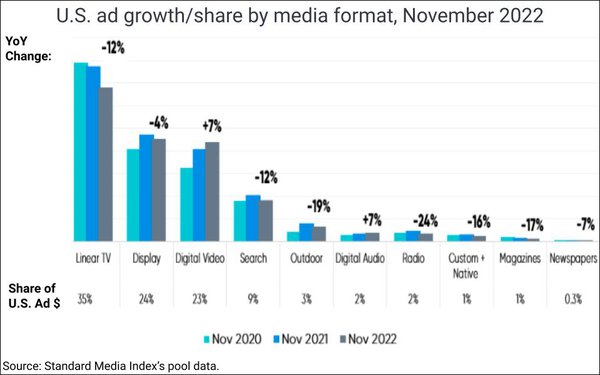Digital Ad Spending Declined In November, Linear TV Falls To 35% Share
- by Joe Mandese @mp_joemandese, December 20, 2022

For the first time since July 2020, digital ad spending declined in November, according to new data from Standard Media Index (SMI).
The analysis, which is derived from SMI's pool of data of actual media buys made by the major agency holding companies and independent media-buying agencies, found overall digital ad spending contracted 1%.
The analysis also is the first from SMI to include new media breaks based on ad formats, and shows that a new break for "digital video" rose 7% in November, helping to offset digital's overall decline in November.
"Digital video really carried stability for digital overall," SMI Director of Advertising Insights Nicole McCurnin said.
The data also shows linear TV ad spending fell 12%, driving the share of U.S. ad spending for the long-dominant medium to 35% vs. 23% for digital video, which includes any digital ad format running on websites, platforms or CTV apps and devices.
advertisement
advertisement
Recent analyses from agency holding company forecasters -- most notably GroupM's Business Intelligence team -- have noted a marked "deceleration" in digital ad spending based on third quarter earnings releases of major digital platforms, especially Meta.
During their third quarter earnings call with analysts and investors, Meta executives did single out an underwhelming ad marketplace response to their push to make Facebook and Instagram "Reels" a premium video advertising unit, some observers believe they may have saturated the market with too much supply of video inventory to quickly, especially given its timing with an overall economic downturn.
"[Total digital ad spending] was down 1%," McCurnin noted, adding, "but digital video helped offset that as a lot of these other channels receded."
McCurnin called digital video's performance a "bright spot" for November, which fell 7% overall, though she also noted it compares with record ad spending in November 2021, which was the first month ever to top $4 billion in U.S. ad spending.
The data also reveals that digital "native" advertising formats account for a 1% share of total U.S. ad spending, but declined 16% year-over-year in November.




Incorrect that this is the first time since 1990 that digital fell. Remember that the internet bubble burst in the early 2000s. According to PQ Media, digital fell 14.5% in 2001 and an additional 23.3% in 2002. In 2009, during the great recession it almost fell again - internet actually did by 0.8%, but the nascent mobile market rose 40%, so overall digital increased 0.5% in 2009.
Joe, many of these media options are not competing directly for the same media spending budgets so what you get is sort of an apples vs oranges situation when it comes to interpreting them. For example, "TV's " share of national ad spending by branding advertisers, including "linear" and streaming, is around 50-60% and if you add digital video ---which is also "TV", albeit often with non-" premium" content---the figure rises to around 75%, maybe higher. So, "TV" is not really competing with digital display, most types of print media, radio, etc. except at a very minimal level. With search the same thing applies in reverse. Search may be involved with a national branding advertiser's sales promotion effort---but it's not competing with the same advertiser's branding budget which is usually dominated by "TV". Often the same people are not involved.
The solution would be if the various sources found a way to define these ad spend stats by the function of the campaigns in each medium---don't hold your breath on that one---or, at least, to present them by finely defined types of advertising where it's the same brands and how they are allocating their spending.